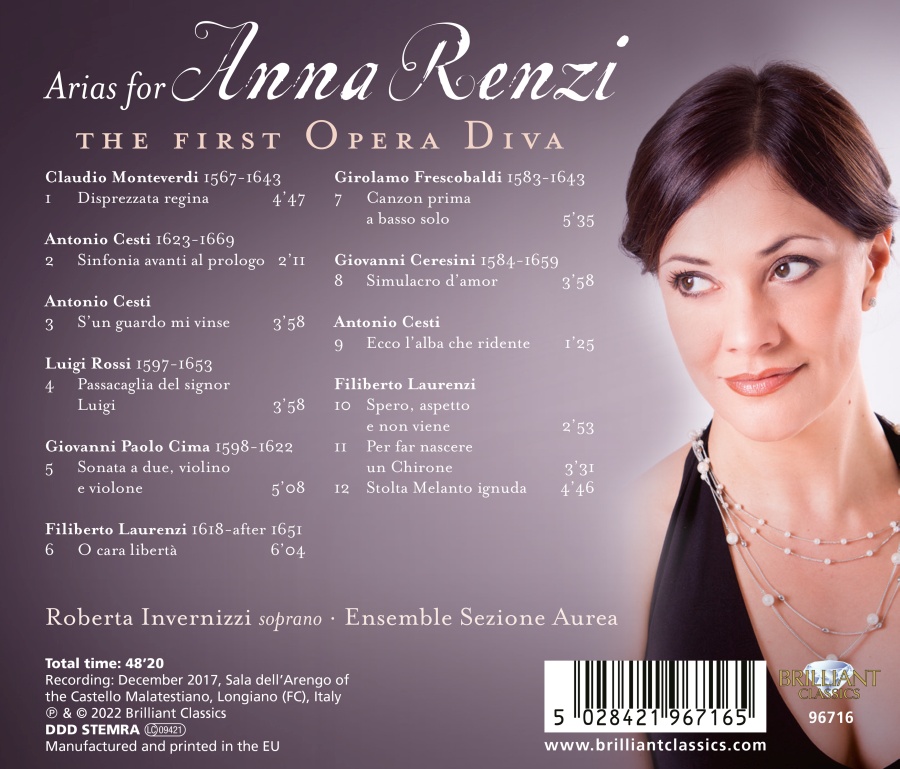
kompozytor
różni kompozytorzy
tytuł
Arias for Anna Renzi, the First Opera Diva
pełny spis kompozytorów
Monteverdi, Claudio;
Cesti, Antonio;
Rossi, Luigi;
Cima, Giovanni Paolo;
Laurenzi, Filiberto;
Frescobaldi, Girolamo;
Ceresini, Giovanni
Cesti, Antonio;
Rossi, Luigi;
Cima, Giovanni Paolo;
Laurenzi, Filiberto;
Frescobaldi, Girolamo;
Ceresini, Giovanni
wykonawcy
Invernizzi, Roberta;
Ensemble Sezione Aurea
Ensemble Sezione Aurea
nr katalogowy
96716
opis
Anna Renzi (c. 1620 – after 1661) was an Italian soprano renowned for her acting ability as well as her voice, who has been described as the first diva in the history of opera. Born in Rome, Anna Renzi was highly popular in Vienna in 1640s and made her debut in 1640 at the Palazzo Pallavicini-Rospigliosi in the presence of Cardinal Richelieu, as Lucinda in Il favorito del principe by the young composer Filiberto Laurenzi, who continued to function as her teacher and/or accompanist in later years. She became the most celebrated and highest-paid singer of the age, and famous composers wrote especially for her. Composers tended to make use of the full extent of Renzi's voice, which spanned from middle C to high B-flat, and the four surviving non-Monteverdian settings of roles written for her (by Sacrati, Laurenzi, Cesti and Ziani) are characterized by strong dramatic, emotional and stylistic contrasts, designed to show off her uncanny command of vocal and expressive means.
•Cesti: Ecco l’alba che ridente (from L’Argia)
•Cesti: L’Argia: Sinfonia
•Cesti: S’un guardo mi vines (from L’Argia)
•Cima, G: Sonata a due, violino e violone
•Frescobaldi: Canzon prima Basso solo (1634)
•Laurenzi: Oh, cara libertà
•Laurenzi: Per far nascere un chirone (from La finta savia)
•Laurenzi: Spero, aspetto e non viene (from La finta savia)
•Laurenzi: Stolta melanto ignuda (from La finta savia)
•Monteverdi: Disprezzata regina (L'incoronazione di Poppea)
•Rossi, Luigi: Passacaglia del signor Luigi
This highly original program includes arias by Monteverdi, Laurenzi, Cesti, Rossi, Ceresini and Frescobaldi.
Sung by Roberta Invernizzi,, one of the leading sopranos in Early Music, sometimes called “The Diva of Early Music”. She collaborated with Nikolaus Harnoncourt, Alan Curtis, Ottavio Dantone, Ton Koopman, Fabio Biondi, and many more. On this recording she is accompanied by Ensemble Sezione Aurea, conducted by Filippo Pantieri.
Works:
•Ceresini: Simulacro d’amor
•Cesti: Ecco l’alba che ridente (from L’Argia)
•Cesti: L’Argia: Sinfonia
•Cesti: S’un guardo mi vines (from L’Argia)
•Cima, G: Sonata a due, violino e violone
•Frescobaldi: Canzon prima Basso solo (1634)
•Laurenzi: Oh, cara libertà
•Laurenzi: Per far nascere un chirone (from La finta savia)
•Laurenzi: Spero, aspetto e non viene (from La finta savia)
•Laurenzi: Stolta melanto ignuda (from La finta savia)
•Monteverdi: Disprezzata regina (L'incoronazione di Poppea)
•Rossi, Luigi: Passacaglia del signor Luigi
nośnik
CD
gatunek
Muzyka klasyczna
producent
Brilliant Classics
data wydania
02-11-2022
EAN / kod kreskowy
5028421967165

(Produkt nie został jeszcze oceniony)
cena 55,00 zł
lubProdukt dostepny w niewielkiej ilości.
Wysyłka w ciągu 3 dni roboczych
Darmowa wysyłka dla zamówień powyżej 300 zł!
Darmowy kurier dla zamówień powyżej 500 zł!
sprawdź koszty wysyłki












































